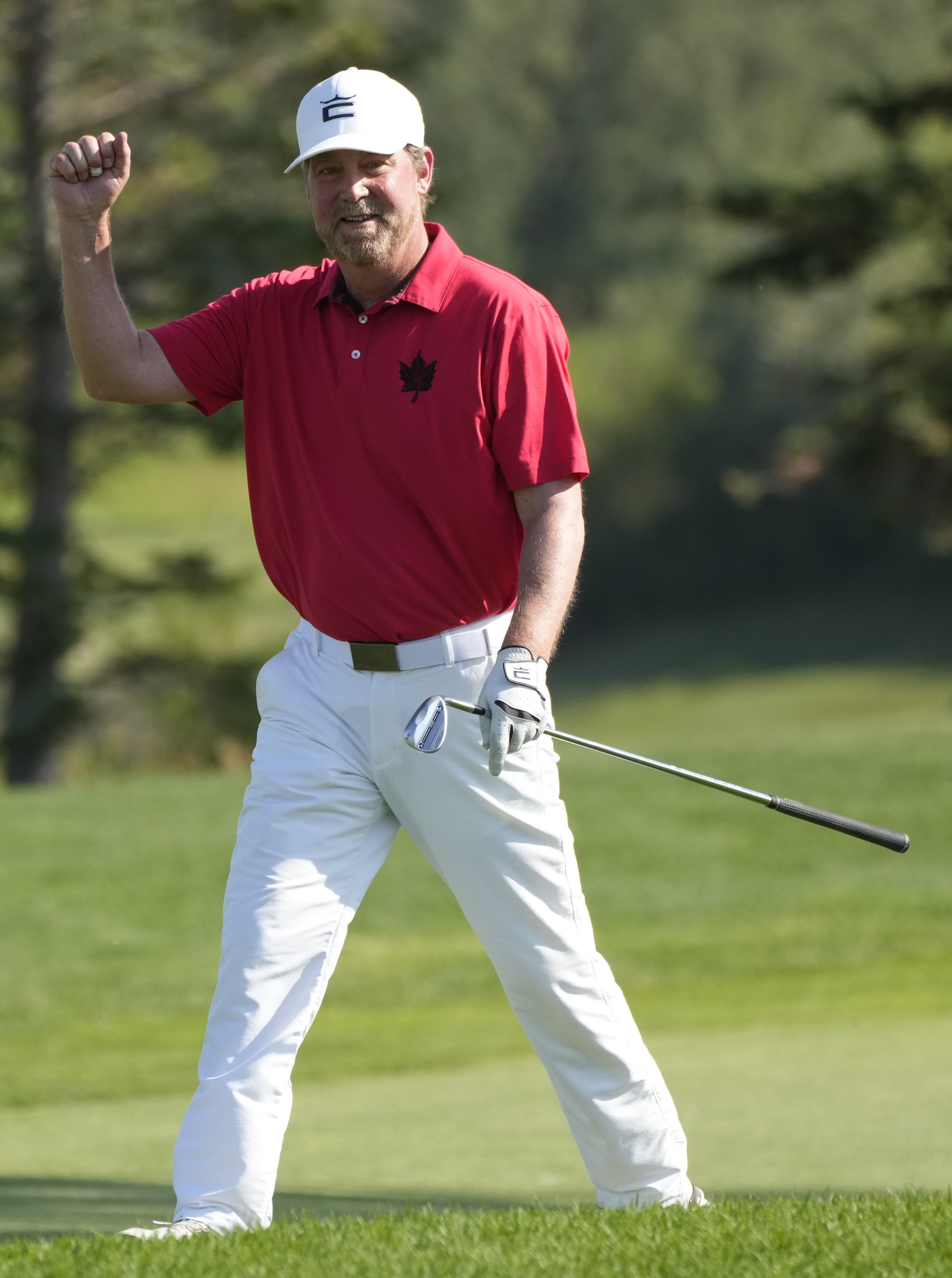TORONTO, Oct. 31, 2024 (GLOBE NEWSWIRE) -- In a stunning turnaround, the once universally grim prognosis for lung cancer is transforming into a story of hope and resilience for more and more patients. Canadians like pro golfer and Calgary financial advisor Steve Blake, who made headlines this summer by being granted an exemption to play in the PGA Tour Champions Rogers Charity Classic, and Victoria-based tech marketer Katie Hulan, who has turned a six-month survival prediction in early 2021 into nearly four years of quality life, are living proof of the progress being made in the treatment of lung cancer. Lung Health Foundation (LHF), the premier resource on lung health for all Canadians, reports that 2024 marks a watershed moment in lung cancer treatment and survival.
When 56-year-old Blake first heard the words ‘inoperable lung cancer with only 12-24 months to live,’ his world crumbled. But today, Blake isn’t just surviving -- he’s thriving. As an Ambassador of H.O.P.E. (Helping Others Persevere through Experience) for the Lung Health Foundation (LHF) and its Lung Cancer Awareness Month campaign in November, he’s become a beacon of hope for thousands. Hulan, 36, has been loudly advocating for lung cancer research as a LHF Ambassador and a grateful recipient of groundbreaking treatments that have extended her life well beyond expectations.
“There is always hope for one more day, or one or more years of a quality life -- if we invest in research. It’s the reason why I’m still here,” she says.

For Steve Blake’s message of hope: Meet Steve Blake | “Live Life, Love Something” Building Hope in the Face of Lung Cancer

For Katie Hulan’s message of hope: Meet Katie Hulan | Thriving with Lung Cancer: A Journey of Hope, Life, and Quality
A new dawn for lung cancer treatment
“Today, there is a strong message of hope for a patient community that has struggled for access to screening and treatment, and that has been dealing with unwanted stigma for far too long,” says LHF President and CEO Jessica Buckley. “For every life saved by these innovations, there is a family that gets more time together,” she emphasizes of the human impact behind the data.
Thanks to revolutionary advances in treatments, screening, diagnostics, tobacco control and novel research, the 32,000 Canadians facing a lung cancer diagnosis this year have unprecedented reasons for optimism. The Lung Health Foundation has played a pivotal role in ensuring that these breakthroughs include the experiences of real patients and caregivers. Since launching a new patient input system in August 2024, the LHF has already provided critical input on five potentially lifesaving drugs currently under review by the Canada Drug Agency (CDA).
“I remember feeling like I’d been punched in the gut by Mike Tyson when I got my diagnosis,” Blake recalls. “But here I am, living proof that breakthroughs in medicine really do work.”
Blake’s Calgary oncologist, Dr. Vishal Navani, echoes his patient’s enthusiasm: “I have never had this many tools in my toolbox to help Canadians fight lung cancer. It’s a new day in the treatment of lung cancer.”
The new frontier of acutely targeted, personalized, customized, non-invasive, non-chemo therapeutics are helping patients like Hulan. “After being on targeted therapy a few weeks after my diagnosis, the CT scan came back showing incredible improvements -- the lesions on my liver shrunk up to a third of their original size. The cancer in my lung decreased significantly. Both my health team and I were shocked. It wasn’t expected that I would have this much success in just two weeks.”
As for Blake’s journey, he is currently on a targeted treatment administered as an infusion for his rare cancer mutation, EGFR Exon 20. Like Hulan, he is outliving his initial prognosis.
Their best advice to anyone who is newly diagnosed with lung cancer is this: “Ask to get biomarker testing done to learn more about your cancer type. This could mean you are eligible for targeted therapies that can have huge success.”
Advances in precision medicine
Further fueling the optimism are the advancements in precision medicine, which have transformed treatment options for non-small cell lung cancer. Long-term survival rates have tripled, climbing from 5% to over 15%. “This remarkable improvement underscores the impact of recent medical breakthroughs,” says Buckley. “Increased access to screening and funding lung cancer research is so important”.
Since 2015, lung cancer death rates have decreased by 3.8% annually -- the steepest decline ever recorded in Canada. A wave of promising new treatments, including targeted therapies and innovative combinations, is on the horizon, offering patients both extended life and preserved quality of life. Dr. Navani explains: “We now know that lung cancer is not a single disease, but dozens of molecularly distinct variations. This understanding opens new frontiers in personalized medicine.”
Hope on the Road: Mobile lung cancer screening units could save thousands of lives
But it's not just new treatments bringing hope -- it's also new ways of delivering care. Mobile lung cancer screening is demonstrating the potential to save thousands of lives across Canada.
Lung cancer remains the leading cause of cancer death, but early detection through mobile screening could significantly improve survival rates, says Buckley. “Research suggests that by bringing screening to underserved communities, we can detect lung cancer at earlier, more treatable stages.”
The Lung Health Foundation has partnered with Healthcare Together and Dr. Geoffrey Liu of the University Health Network (UHN) to study the feasibility of a mobile lung cancer screening program in Ontario. The results are promising, but Buckley stresses that government action is needed: “To make this vision a reality, governments need to act swiftly. With proper funding, mobile units could be deployed across Ontario and even nationwide by as early as 2027.”
Dr. Liu adds: “Fewer than 5% of eligible Canadians are screened for lung cancer, and the rates are even lower in rural and Indigenous communities. Mobile screening could bridge this gap.”
Canadians who wish to voice their support for mobile screening solutions can add their signature to the Lung Health Foundation’s official pledge letter here.
Hope on the Journey: Connection, community, and spreading a message of resolve
For patients like Steve Blake, hope isn’t just a possibility -- it’s a lifeline. “Hope isn't innate; it's something we cultivate,” Blake shares. “I want to connect with others on this journey and show them that there's light even in the darkest moments. As more of us live longer, the greater our connection and need to share our stories of hope.”
Hulan echoes his sentiments: “I have been given a quality of life that I want for every person living with lung cancer. I am part of these advancements, and for me, they work -- for my body and my mind.”
Lung Health Foundation Programs
The message is clear: hope is no longer a distant dream. For thousands of Canadians facing lung cancer, it’s becoming a reality. Lung Health Foundation is committed to shining a bright light on this progress.
Lung Health Foundation Programs are made available to all Canadians because of the generous funding support of the public and private sectors.
“We are here to help Canadians live with lung cancer, not just deal with lung cancer,” says Jody Hamilton, LHF’s Director of Community Programs and Partnerships. “Our programs and supports ensure that no one has to walk this journey alone.”
- The Loop: Join a vibrant community where people share experiences and offer support to one another.
- 1:1 Support: Speak with a Certified Respiratory Educator who can provide psychosocial support, refer you to resources, or connect you to a peer support volunteer who’s been in your shoes.
- Education: Attend free quarterly sessions led by experts in fitness, nutrition, and financial planning to help manage lung cancer and maintain overall well-being.
- Fitness for Breath: Improve lung health and maintain an active lifestyle through tailored exercises that promote physical fitness.
About Lung Health Foundation:
The Lung Health Foundation (LHF) is the premier resource on lung health for all Canadians. With a focus on research, education, and advocacy, the Foundation works tirelessly to prevent lung disease, help people manage their lung conditions, and promote policy change to create a world where everyone can breathe easier. The Lung Health Foundation encourages individuals to connect with their Lung Health Line for one-on-one advice from Certified Respiratory Educators. For assistance, call 1-888-344-LUNG, email info@lunghealth.ca, or engage in live chat at lunghealth.ca
